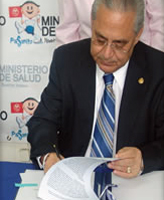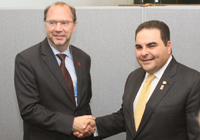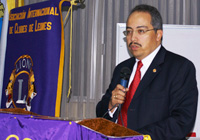The Martin Ennals Foundation has announced the names of the three finalists for the prestigious global Martin Ennals Award for human rights defenders, which will be awarded in October 2017. One of the three finalists is Karla Avelar, a transgender woman living with HIV from El Salvador who, for more than 20 years, has been defending the human rights of lesbian, gay, bisexual, transgender and intersex (LGBTI) people and advocating for access to health care for people living with HIV.
In 1996, Ms Avelar was one of the founders of the first association of transgender people in El Salvador, and in 2008 she founded the first organization of transgender women living with HIV, COMCAVIS TRANS. The organization works to advance, defend and promote the human rights of LGBTI people, scale up HIV prevention and care and improve access to HIV services for people living with HIV and prisoners.
"On a daily basis, lesbian, gay, bisexual, transgender and intersex people are exposed to death threats, extortion, harassment, physical and verbal violence and discrimination because of our gender identity or sexual orientation,” said Ms Avelar. “This situation makes us vulnerable to HIV."
In El Salvador, the HIV epidemic is concentrated among key populations; men who have sex with men have an estimated HIV prevalence of 10.3%, dramatically higher than the HIV prevalence among the general population, which stands at 0.5%.
Ms Avelar, together with COMCAVIS TRANS peer educators, promotes HIV testing and HIV prevention and care among the LGBTI people through outreach activities, such as education and information dissemination in different parts of San Salvador.
Ms Avelar and her team also work on strengthening access to HIV prevention and treatment services for LGBTI prisoners in two penitentiary centres. “We are working on two fronts: with lesbian, gay, bisexual, transgender and intersex people, training them on sexual and reproductive health and HIV prevention, and raising awareness among administrative officials and custodial staff on human rights and zero discrimination,” explained Ms Avelar.
In 2013, the partnership between COMCAVIS TRANS and the penitentiary center of SENSUNTEPEQUE led to the adoption of an agreement, which allows prisoners to have access to condoms each month. COMCAVIS TRANS also supports LGBTI prisoners living with HIV to adhere to their treatment and monitors their access in order to ensure their psychosocial and emotional well-being.
In El Salvador, LGBTI people continue facing a climate of discrimination and violence, exacerbated by high levels of impunity and limited access to justice. “El Salvador is a country with one of the highest rates of violence in Latin America and, as it is the case throughout the region, the life expectancy of a transgender woman does not exceed 35 years,” said Ms Avelar.
She supports LGBTI people who have suffered human rights violations and acts of violence. Together with her team and the group of volunteers, she advises them and accompanies them to file a complaint. Thanks to the collaboration of other organizations, she makes sure that people in need have open channels to legal and economic assistance. “There are still a lot of barriers,” she says. “However, we are promoting a dialogue with representatives of the national civil police and Office of the National Counsel for the Defense of Human Rights and other authorities to improve the mechanisms to denounce and investigate human rights violations and provide proper and sustained monitoring and evaluation.”
Ms Avelar has also played a significant role advocating for legislation reforms to protect and promote the rights of LGBTI people and address their needs. For example, together with UNAIDS and other national organizations, she participated in a review of an HIV law approved last January. Among other things, the law allows transgender people to receive a better health care free of stigma and discrimination, improve their quality of life and access to health services, education and work, ensuring the respect to their gender identity.
“For all those who know her, Karla Avelar is already the winner of the Martin Ennals Award,” said Celina Miranda, UNAIDS Country Director for El Salvador. “In the midst of all adversity, she is a tireless advocate for human rights, making a difference in the lives of lesbian, gay, bisexual, transgender and intersex people in El Salvador.”
About the Martin Ennals Award
The Martin Ennals Award is an annual prize for human rights defenders. Finalists and the laureate are selected by a jury of 10 of the world’s leading human rights nongovernmental organizations.
UNAIDS is working with partners to reaffirm that the full enjoyment of all human rights and fundamental freedoms for all supports the global response to the AIDS epidemic, including in the areas of prevention, treatment, care and support, and address stigma and discrimination against all people living with, presumed to be living with, at risk of and affected by HIV as a critical element in ending the AIDS epidemic and as outlined in the 2016 United Nations Political Declaration on ending AIDS.







 Dr. Guillermo Maza, Minister of Health of El Salvador signing the ministerial decree on 5th March 2009.
Dr. Guillermo Maza, Minister of Health of El Salvador signing the ministerial decree on 5th March 2009.






